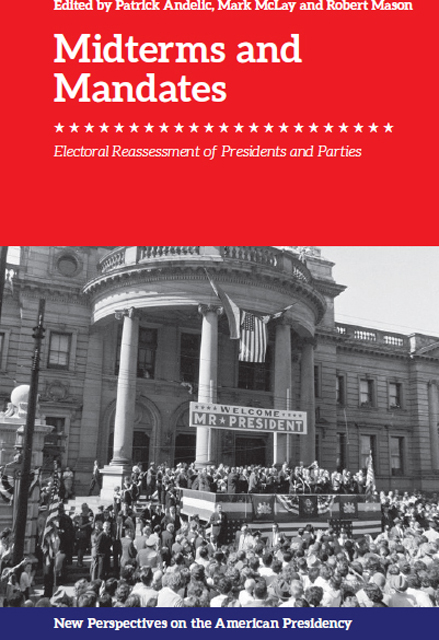Book contents
- Frontmatter
- Contents
- List of Figures and Tables
- Acknowledgements
- Notes on Contributors
- Preface: Why Midterms Matter
- Introduction: Midterms and Mandates, Presidents and Parties
- Part One Midterm Elections in Institutional Context
- Part Two Testing the New Deal Coalition
- Part Three The Republican Resurgence
- Index
2 - From Election to Re-election: The Electoral Politics of Presidency and Party, 1960–2012
Published online by Cambridge University Press: 07 June 2023
- Frontmatter
- Contents
- List of Figures and Tables
- Acknowledgements
- Notes on Contributors
- Preface: Why Midterms Matter
- Introduction: Midterms and Mandates, Presidents and Parties
- Part One Midterm Elections in Institutional Context
- Part Two Testing the New Deal Coalition
- Part Three The Republican Resurgence
- Index
Summary
Midterms are part of a political system characterised by frequent elections; in a political system also characterised by a focus on the presidency, these are contests when the White House is not subject to electoral competition but when there are many candidates representing – and opposing – the president’s party. The relationship between president and party is one that has been the subject of scholarly neglect by contrast with other aspects of the presidency – not surprisingly, perhaps, because this is a system further characterised, at least for much of the period investigated in this book by weak parties and, increasingly, by ‘candidate-centred’ politics. Through an investigation of midterms, this book explores the relationship between presidents and parties, analysing the meaning and the impact of these elections when a president is not on the ballot. At the heart of this chapter is the relationship between president and party; it scrutinises the extent to which successful presidential candidates over time have employed party-oriented – as opposed to candidate-centred – rhetoric on the campaign trail, in search of the White House, by comparison with incumbent presidents seeking re-election. It finds that there has been much more discussion of party during these campaigns than prevailing understandings of candidate-centred politics suggest; it also finds that there are significant differences between successful initial campaigns and re-election bids. In turn, this creates a context within which to reflect on midterms and their meanings.
The focus, then, for this exploration of the relationship between president and party involves campaign rhetoric, specifically campaign speeches, between 1960 and 2012. All campaign speeches from presidential election and re-election campaigns have been analysed on a weekly basis, focusing on the use of party within speeches; that is the use of party affiliation to reinforce predispositions of the electorate or encourage the electorate to vote for the candidate in question.
Use of party in campaign speeches
Presidential candidates can try to use their party affiliation, as a Democrat or Republican, to reinforce any predispositions the electorate may have, encouraging the electorate to vote for them. Conversely, some of the electorate may use the party as a way to decide how to vote.
- Type
- Chapter
- Information
- Midterms and MandatesElectoral Reassessment of Presidents and Parties, pp. 54 - 71Publisher: Edinburgh University PressPrint publication year: 2022



